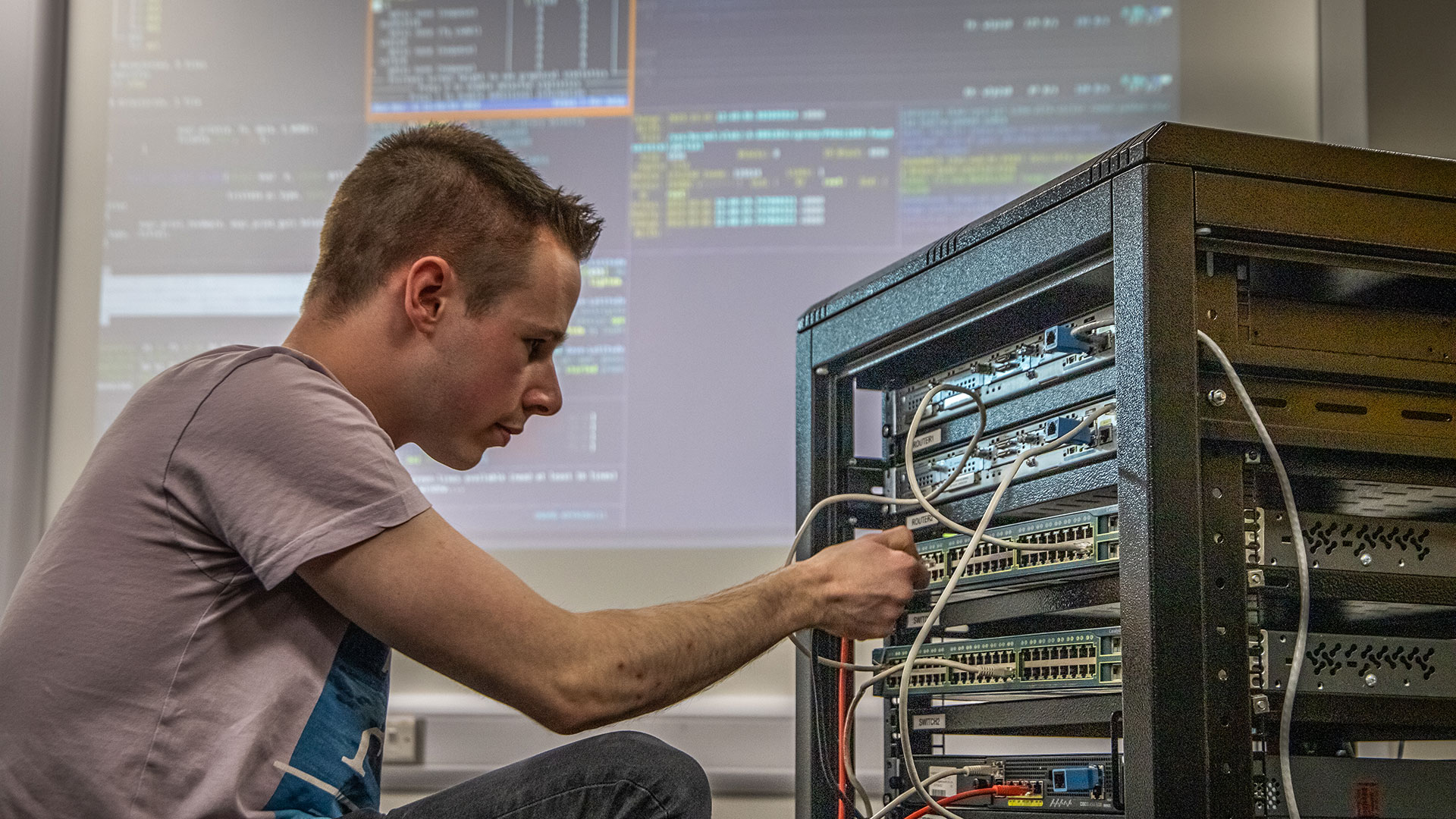Search
Computing for England (Cyber Security) HTQ
Study level: UndergraduateHNC/HND courses
HTQ courses

This Computing for England (Cyber Security) HTQ course has been designed to develop students’ knowledge and understanding in relation to cyber threats and vulnerabilities, cyber defence techniques and incident response.
Course features
Year of entry
Location
CU Scarborough (Scarborough)
Study mode
Full-time
Duration
2 years full-time
Course code
HQ02
Start date
January 2026
March 2026
May 2026
June 2026
Course overview
Students will explore fundamental principles as well as leading-edge concepts, terminologies, models, and hardening methods.
You will assess the types of malicious activity and potential targets, and the role everyone has in maintaining cyber resilience.
On successful completion of this course, you should have;
- explored the nature of cybercrime and cyber threat actors
- looked into the roles and responsibilities in relation to information assurance
- assessed the threats to, and vulnerabilities in ICT infrastructure
- investigated strategic responses to cyber security threats.
The pathways at both Level 4 and Level 5 are mapped to the Institute for Apprenticeships and Technical Education’s Occupational Standards and professional body standards with the aim of providing professional status Level 5 HND and progression to direct employment, upon successful completion of this course. The vendor-accredited certification indicates that the course meets industry standards and prepares students with the necessary knowledge and skills required to enter the workforce. Additionally, obtaining a vendor-accredited certification can demonstrate to employers that a student has achieved a certain level of expertise and competence in a particular area.
Why you should study this course
With continuing digital revolution, computer systems are involved with just about every aspect of our lives. Whilst this connectivity procures advantages, it also implies vulnerabilities to personal data, interference with the operation of our devices, or even hijacking.
- Due to the complex nature of these devices, and their interconnectivity, it is difficult to understand or predict where the potential for risk lies. Significant laboratory-based practical work to enable systems to be built, interrogated and evaluated4.
- Peer learning by interrogating and critiquing the work of peers in a supportive environment.
- The use of authentic case studies and scenarios based on real issues. • The employment of gaming approaches and technologies to provide immersive engagement.
- The opportunity to undertake both mini-projects and larger-scale work, working both individually and in collaboration.
- The development of a community of practice where experimentation and innovation is encouraged.
- Field trips to experience current professional/employment contexts and frequent guest speakers from industry.
- An ethos that encourages questioning and criticality of both self and others in a supportive and professional context.
- A strong and embedded focus on legal, social, ethical and professional issues throughout.

Accreditation and professional recognition
The course is being delivered under the Intellectual Property License of Pearson Education Limited.

For SASIG to hold their first national networking event in North Yorkshire at CU Scarborough highlights the strength of our cyber security course, gives our cyber security students who have registered to the event access to industry experts and shows that Scarborough is fast becoming a major player and a centre of excellence within the cyber sector.
Jackie Mathers, Associate Pro Vice Chancellor at CU Scarborough

What you'll study
We regularly review our course content, to make it relevant and current for the benefit of our students. For these reasons, course modules may be updated.
How you'll learn
As a full-time undergraduate student, you will study modules totalling 120 credits each academic year. A typical 20 credit module requires a total of 200 hours study. This is made up of teaching contact hours, guided and independent study.
Teaching contact hours
Teaching hours vary each semester, year of study and due to module selection. During your first year you can expect 15-18 teaching hours each week. You will also have the option to attend optional sessions including time with a progress coach or to meet with staff for advice and feedback. As you progress through your studies, teaching hours may reduce.
Guided and independent study
Throughout your studies, you will be expected to spend time in guided and independent study to make up the required study hours per module. You’ll be digging deeper into topics, review what you’ve learned and complete assignments. This can be completed around your personal commitments. As you progress through your studies, you’ll spend more time in independent study.
Online learning
As an innovative university, we use different teaching methods including online tools and emerging technologies. So, some of your teaching hours and assessments may be delivered online.
Assessment
This course will be assessed using a variety of methods which will vary depending upon the module. The assessment methods may include:
- formal examinations
- phase tests
- essays
- group work
- presentations
- reports
- projects
- coursework
- exams
- individual assignments.
The Coventry University Group assessment strategy ensures that our courses are fairly assessed and allows us to monitor student progression towards achieving the intended learning outcomes.
Entry requirements
Typical entry requirements:
Fees and funding
| Student | Full-time | Part-time |
|---|---|---|
| UK | £9,535 per year | Not available |
| International | Not available | Not available |
For advice and guidance on tuition fees and student loans visit our Undergraduate Finance page and see the University’s Tuition Fee and Refund Terms and Conditions.
The University will charge the tuition fees that are stated in the above table for the first Academic Year of study. The University will review tuition fees each year. For UK (home) students, if Parliament permits an increase in tuition fees, the university may increase fees for each subsequent year of study in line with any such changes. Note that any increase is expected to be in line with inflation.
For international students, we may increase fees each year, but such increases will be no more than 5% above inflation. If you defer your course start date or have to extend your studies beyond the normal duration of the course (e.g. to repeat a year or resit examinations) the University reserves the right to charge you fees at a higher rate and/or in accordance with any legislative changes during the additional period of study.
We offer a range of international scholarships to students all over the world. For more information, visit our international scholarships page.
Tuition fees cover the cost of your teaching, assessments, facilities and support services. There may be additional costs not covered by this fee such as accommodation and living costs, recommended reading books, stationery, printing and re-assessments should you need them.
The following are additional costs not included in the tuition fees:
- Any optional overseas field trips or visits: £400+ per trip.
- Any costs associated with securing, attending or completing a placement (whether in the UK or abroad).
Irish student fees
The rights of Irish residents to study in the UK are preserved under the Common Travel Area arrangement. If you are an Irish student and meet the residency criteria, you can study in England, pay the same level of tuition fees as English students and utilise the Tuition Fee Loan.
Facilities
Our purpose-built campus building is arranged around an open central atrium and includes:
- Cyber labs, a space designed to give you - computing and cyber course students - a practical learning experience for conducting research, testing and experimentation related to cyber security.
- indoor social spaces, including a café
- a library that includes loan laptops and a silent study area
- open-access computers
- student support and careers advice teams.
The campus itself is located next to Scarborough’s Sports Village, a complex that includes an Olympic Legacy swimming pool, a sports hall, a fitness suite, all-weather pitches, and the Scarborough Athletic Football Club ground.
The campus is a 10-minute walk from the East Yorkshire seafront. North Bay is Scarborough’s Blue Flag beach, meaning it is one of the best in Europe for cleanliness both on the sand and in the water, facilities, and safety.
Facilities are subject to availability. Access to some facilities (including some teaching and learning spaces) may vary from those advertised and/or may have reduced availability or restrictions where the university is following public authority guidance, decisions or orders.
Careers and opportunities
Our Talent Team will help you in searching for work experience while you study and employment on graduation.
Coventry University is committed to preparing you for your future career and giving you a competitive edge in the graduate job market. The University’s Talent Team provide a wide range of support services to help you plan and prepare for your career.
Further study
The Level 5 Higher National Diploma is recognised by higher education providers as meeting admission requirements to many computing-related courses. Within CU Group you could progress onto Level 6 in:




